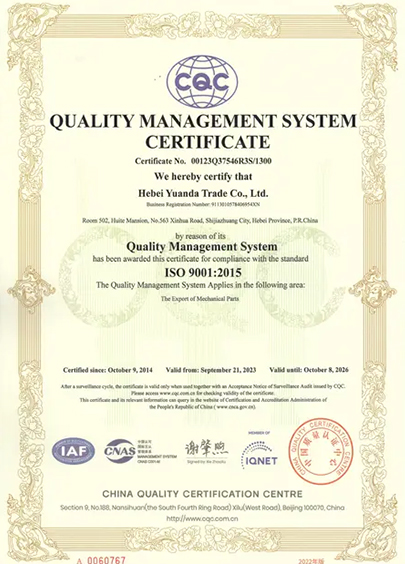Mobile:+86-311-808-126-83
Email:info@ydcastings.com
English
precision aluminum casting
Precision Aluminum Casting An Overview
Precision aluminum casting is a sophisticated manufacturing process that plays a vital role in numerous industries, including automotive, aerospace, and electronics. This technique involves the careful shaping and molding of aluminum to create components with exact specifications and tolerances. As industries increasingly demand lightweight yet strong materials, precision aluminum casting has emerged as a crucial solution.
Aluminum casting begins with the selection of high-quality aluminum alloys that are specifically formulated to meet the mechanical and thermal requirements of the final product. The casting process can take several forms, including sand casting, investment casting, and die casting. Each method has its unique advantages and is chosen based on the intended application and desired characteristics of the finished piece.
One of the most significant advantages of precision aluminum casting is its ability to produce intricate designs with high accuracy. This is particularly important in applications where component dimensions are critical. For instance, in the aerospace industry, components must not only fit together perfectly but also perform reliably under extreme conditions. Precision casting allows manufacturers to create parts that meet these stringent requirements efficiently.
precision aluminum casting

Moreover, aluminum’s lightweight nature contributes to fuel efficiency and performance, making it a preferred material in automotive design. By utilizing precision casting techniques, manufacturers can reduce the overall weight of vehicles, leading to lower fuel consumption and reduced emissions. The automotive industry has embraced precision aluminum casting for parts such as engine blocks, transmission housings, and wheel rims, proving that it is an indispensable part of modern vehicle manufacturing.
Investment casting, in particular, has gained popularity due to its superior surface finish and dimensional accuracy. This method involves creating a wax pattern, which is then coated in a ceramic shell. Once the shell hardens, the wax is melted away, leaving a cavity for molten aluminum to be poured. This process minimizes post-casting machining requirements, thereby reducing production time and costs.
However, the precision aluminum casting process is not without challenges. Maintaining consistent quality throughout production can be difficult, as variations in temperature, alloy composition, and tooling can affect the final product. To combat these issues, manufacturers implement strict quality control measures, including advanced inspection techniques and process monitoring systems. These practices ensure that each component meets required standards and performs reliably in its intended application.
In conclusion, precision aluminum casting is a cutting-edge manufacturing technique that provides numerous benefits across a variety of industries. With its ability to produce lightweight, strong, and intricately designed components, it is a cornerstone of modern manufacturing. As technology continues to advance, the precision aluminum casting process is expected to evolve, leading to even greater efficiencies and capabilities in the production of critical components for the future. As industries strive for innovation and sustainability, precision aluminum casting will undoubtedly play a key role in shaping the future of manufacturing.
-
Materials Used in Manufacturing Cap End Pipe FittingsNewsNov.24,2025
-
Material Properties of CF8M CastingNewsNov.24,2025
-
How to Inspect Pump Cap Ends for DamageNewsNov.21,2025
-
Backward Curved Impeller – Efficient Airflow Solutions for Industry | YD CastingsNewsNov.21,2025
-
Automobile Water Pump - Efficient, Quiet, Durable & ElectricNewsNov.21,2025
-
Impeller for Pumps – High-Efficiency, Durable, OEM-ReadyNewsNov.21,2025











